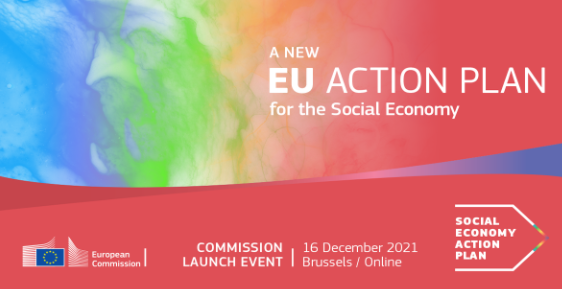From Duncan Walker
EU Commission announces new Social Economy Action Plan
On Thursday 9th December, the EU Commissioner for Jobs & Social Rights Nicolas Schmit, announced the much-anticipated action plan for the European social economy – “Building an economy that works for people: an action plan for the social economy”
In this article we briefly summarise the key points as released by the European Commission. Over the coming weeks and months, we will continue to work with our European partners (ENSIE, Social Economy Europe, Diesis, Euclid Network) to obtain more information on the action plan.
What is the social economy?
There are 2.8 million social economy entities in Europe that employ 13.6 million people and which offer solutions to key challenges in our societies. Social economy organisations are entities which put social and environmental purposes before profit (“people and planet first”). They reinvest most of their profit back into the organisation or a social cause, and have a democratic or participatory form of governance (“bottom-up”).
The social economy includes a variety of businesses, organisations and legal entities, such as social enterprises, cooperatives, mutual benefit societies (a specific type of collective insurance), non-profit associations and foundations. They operate in many economic sectors, such as social services, health care, social housing, affordable and renewable energy, circular economy, agriculture, financial and insurance activities, culture, media and recreation.
What is the Social Economy Action Plan and why do we need it?
The social economy has an important untapped economic and job creation potential. It can play a key role in a fair and inclusive recovery from the pandemic, as well as in the green and digital transitions. `
Social economy organisations create and retain quality jobs, and contribute to social and labour market inclusion. They drive sustainable economic development, promote the active participation of citizens, and play an important role in Europe’s welfare systems.
To realise its full potential, it is important to raise the social economy’s visibility and create an environment that enables the social economy to thrive and grow.
How will the plan be implemented and by whom?
The Action Plan announces a set of actions by the Commission to strengthen the social economy. It also encourages Member States and other actors to put in place actions to support its implementation and to make the most of the opportunities it offers.
The Commission encourages Member States to adopt or update their social economy strategies and initiatives in cooperation with social economy stakeholders. It also calls on Member States to designate social economy coordinators. The Commission will take stock in 2025, looking at progress made and remaining barriers. [mention – National Social Enterprise Policy for Ireland 2019-2022 due for “renewal” next year, an opportunity to align(?) …..
Who can benefit from the Social Economy Action Plan?
Social economy entities will benefit from the Action Plan as it aims to improve their visibility and recognition, support the development of enabling policy and legal environments, and make it easier to access funding and business support. The Action Plan will help make the social economy better known and understood, including among young people, investors and public authorities.
More generally, the social economy has a wider societal impact and potential, for instance by contributing to social and labour market inclusion. The social economy therefore contributes to implementing the European Pillar of Social Rights Action Plan, including its three 2030 EU headline targets, for instance the increase of the employment rate to 78% and the reduction of the number of people at risk of poverty and social exclusion by at least 15 million.
The information above are extracts from publications released by the Commission on 9th December. If you want more information, you can visit the website of the Social Economy Action Plan which contains links to a number of working documents. On Thursday 13th December, there is a public launch of the Action Plan, and in February 2022 we will be attending the Social Economy: The Future of Europe conference in Strasbourg. As we receive more information, we will share with our network via further blog posts and on social media.



